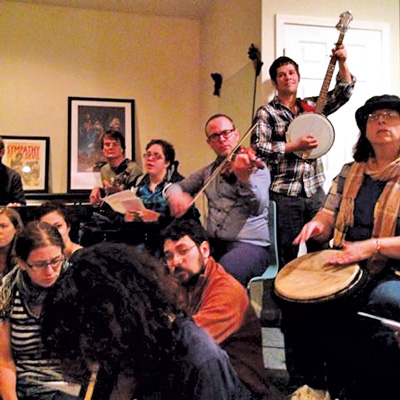Nurturing the sparks
Permanent link
Pictured is a Music Jam, where people bring instruments or just voices and improvise, harmonize and learn the melodies of Mishkan prayer services. Photo credit: Rabbi Lizzi Heydemann
Over fifty years ago, when people were beginning to note a decline in Americans' interest in organized religion, one of my favorite rabbis of all time made this observation:
"Religion declined not because it was refuted, but because it became irrelevant, dull, oppressive, insipid. When faith is completely replaced by creed, worship by discipline, love by habit… its message becomes meaningless."
Rabbi Abraham Joshua Heschel, ladies and gentlemen. (And these words were tame compared to what he said about synagogue life, prayer, education, and the state of Jews' involvement in justice issues in America in the '60s).
While of course there have always been people satisfied and happy with synagogue, Heschel stands as a defender and protector of the Jewish community, saying that if we're seeing declining numbers in our pews (and in the Pew study), we can't blame the competition provided by Netflix or sports leagues or yoga studios. We must ask ourselves how have we allowed a tradition that radiates light, humor, wisdom, moral challenge, fire for social justice, intellectual rigor, and spiritual inspiration to become boring and uninspired?
The big question: How can those of us who care deeply about the current and future state of the Jewish people step up and make it more relevant and attractive? Not just doing better marketing (though that helps), but giving the product itself an upgrade and bringing Judaism into the 21st Century?
This is the question that drove me and the early supporters of Mishkan Chicago to gather for our first Friday night service in a Lincoln Park living room in September, 2011.
Two years later, on any given Friday night, you'll see a scene that looks as much like a tent revival as like a Jewish worship gathering. Vocal harmonies, drum and guitar drive a rhythmic worship experience that has people on their feet, clapping, swaying. We study text together inhevruta (study pairs), and stay late into the night eating and drinking after services.
Our people come from across all denominational backgrounds from Secular Humanist to Orthodox, educated in different faith communities from Catholic to Quaker. Our people are black and white, gay and straight, trans, and cisgendered. Our people are radical progressives and conservatives and libertarians. You'll see couples who met on JDate and interfaith or dual-faith couples. You'll see a ton of single young adults, and a growing number of young families and baby boomers.
We daven (pray) in Hebrew, using a traditional liturgy. Our people tweet and post to Facebook after services to share pearls of wisdom said by a peer during their study, or to share a video they took on their phone during services, capturing the scene of 200 people engaged in ecstatic, soul-lifting prayer. Others walk home and won't turn on lights until Shabbos is over. Everyone sings, eats, drinks, and shares Shabbat.
What I'm saying is, in the words of my teacher Rabbi Irwin Kula, our people are blenders and mixers and benders and switchers. You can't pin us down and say we're Orthodox, Conservative or Reform, secular or religious, that intermarriage or not keeping kosher are signs of disinterest in our Judaism. We show up where we feel inspired and connected, and don't if we don't. The bar has been raised for all of our organizations to meet this totally legitimate desire among Jews today for their religion not to be an heirloom, but a living fountain of inspiration.
When I say, "our people," by the way, I don't just mean Mishkan people. Mishkan people are reflective of the changing complexion of the Jewish community overall, and we would do well to begin to recognize how diverse our people are. Our people are not exclusively white and Ashkenazi, we don't necessarily think Borscht Belt humor is funny, and are politically in a different place than our grandparents, further toward the right and the left. We have complex feelings about Israel. We want to be in a Jewish community as diverse and spiritually alive as we are. And we will leave Netflix at home for that.
We need a different metric and language to measure what it means to be meaningfully Jewish. Light is being shone from many corners of the city through organizations beyond synagogue walls—Jewish urban gardens, queer yeshivas, alternative afterschool programs, young adult spiritual communities, alternative university engagement—and we need to recognize that light as relevant and meaningful, not just some flash in the pan. That light is sparking the next generation of Jews in Chicago.
As a young start-up in one of the strongest and most established Jewish communities in the country, I want to offer a plea to those who can nurture those tiny sparks. A part of Mishkan's success was the willingness of Rabbi Michael Siegel at Anshe Emet Synagogue to help us launch, along with a few visionary individuals who believed that we could help move the needle on Jewish engagement in Chicago. Instead of operating from a place of fear of what they could lose, they fearlessly encouraged us forward, and are now seeing people enter their building for Mishkan who would otherwise not connect with the Jewish community. Mishkan is honored to have received a JUF Breakthrough Grant, which we believe will have the same effect: Rather than shrinking one piece of the pie to grow another, together, we can expand the pie.
What would happen if we entered the future not from a place of fear of decline, but love and excitement about what's possible?
Let's find out.
Rabbi Lizzi Heydemann is the spiritual leader of Mishkan Chicago is an independent, non-denominational Jewish spiritual community in Chicago on a mission to engage, educate, connect and inspire people through dynamic experiences of prayer, learning, music and community-building. Find out more at www.mishkanchicago.org.



.jpg)



